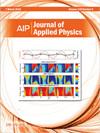Nucleation control of high crystal quality heteroepitaxial Sc0.4Al0.6N grown by molecular beam epitaxy
IF 2.7
3区 物理与天体物理
Q2 PHYSICS, APPLIED
引用次数: 1
Abstract
High ScN fraction ScxAl1−xN has promise in important application areas including wide bandwidth RF resonators and filters, and ferroelectric devices such as non-volatile memory, but demands high crystal quality. In this work, the role of the nucleation layer (NL), ScxAl1−xN growth temperature, and strain management to preserve the wurtzite crystal structure are investigated to maximize both acoustoelectric and ferroelectric material properties for high ScN fraction ScxAl1−xN grown on SiC substrates. A 5 nm AlN nucleation layer reduces the x-ray diffraction 0002 reflection full width at half maximum (FWHM) for a Sc0.32Al0.68N film by almost a factor of 2, and reducing the growth temperature to 430 °C enables a Sc0.40Al0.60N film with a FWHM of 4100 arcsec (1.1°) while being only 150 nm thick. Grading the initial ScxAl1−xN layer from x = 0.32 to 0.40 suppresses the formation of rock-salt grain nucleation at the Sc0.40Al0.60N lower interface and reduces the anomalously oriented grain density by an order of magnitude. Increasing the total ScxAl1−xN growth thickness to 500 nm produces an average x = 0.39 ScxAl1−xN layer with a FWHM of 3190 arcsec (0.89°) and an anomalously oriented grain areal fill factor of 1.0%. These methods enable the lowest heteroepitaxial ScxAl1−xN FWHM reported for x ∼ 0.4, with layer thicknesses and defect densities appropriate for high frequency (>10 GHz) filter applications.分子束外延生长高晶质异外延Sc0.4Al0.6N的成核控制
高ScN分数ScxAl1−xN在重要应用领域有前景,包括宽带RF谐振器和滤波器,以及非易失性存储器等铁电器件,但对晶体质量要求很高。在这项工作中,研究了成核层(NL)、ScxAl1−xN生长温度和应变管理在保持纤锌矿晶体结构方面的作用,以最大限度地提高在SiC衬底上生长的高ScN分数ScxAl1-xN的声电和铁电材料性能。A 5 nm AlN成核层使Sc0.32Al0.68N膜的x射线衍射0002反射半峰全宽(FWHM)降低了几乎2倍,并将生长温度降低到430 °C使得Sc0.40Al0.60N薄膜的FWHM为4100 arcsec(1.1°),而只有150 nm厚。从x开始对初始ScxAl1−xN层进行分级 = 0.32至0.40抑制了在Sc0.40Al0.60N下界面处岩盐晶粒成核的形成,并将异常取向的晶粒密度降低了一个数量级。将ScxAl1−xN的总生长厚度增加到500 nm产生平均x = 0.39 ScxAl1−xN层,FWHM为3190 arcsec(0.89°)和1.0%的异常取向晶粒面积填充因子。这些方法使x ∼ 0.4,层厚度和缺陷密度适用于高频(>10 GHz)滤波器应用。
本文章由计算机程序翻译,如有差异,请以英文原文为准。
求助全文
约1分钟内获得全文
求助全文
来源期刊

Journal of Applied Physics
物理-物理:应用
CiteScore
5.40
自引率
9.40%
发文量
1534
审稿时长
2.3 months
期刊介绍:
The Journal of Applied Physics (JAP) is an influential international journal publishing significant new experimental and theoretical results of applied physics research.
Topics covered in JAP are diverse and reflect the most current applied physics research, including:
Dielectrics, ferroelectrics, and multiferroics-
Electrical discharges, plasmas, and plasma-surface interactions-
Emerging, interdisciplinary, and other fields of applied physics-
Magnetism, spintronics, and superconductivity-
Organic-Inorganic systems, including organic electronics-
Photonics, plasmonics, photovoltaics, lasers, optical materials, and phenomena-
Physics of devices and sensors-
Physics of materials, including electrical, thermal, mechanical and other properties-
Physics of matter under extreme conditions-
Physics of nanoscale and low-dimensional systems, including atomic and quantum phenomena-
Physics of semiconductors-
Soft matter, fluids, and biophysics-
Thin films, interfaces, and surfaces
 求助内容:
求助内容: 应助结果提醒方式:
应助结果提醒方式:


